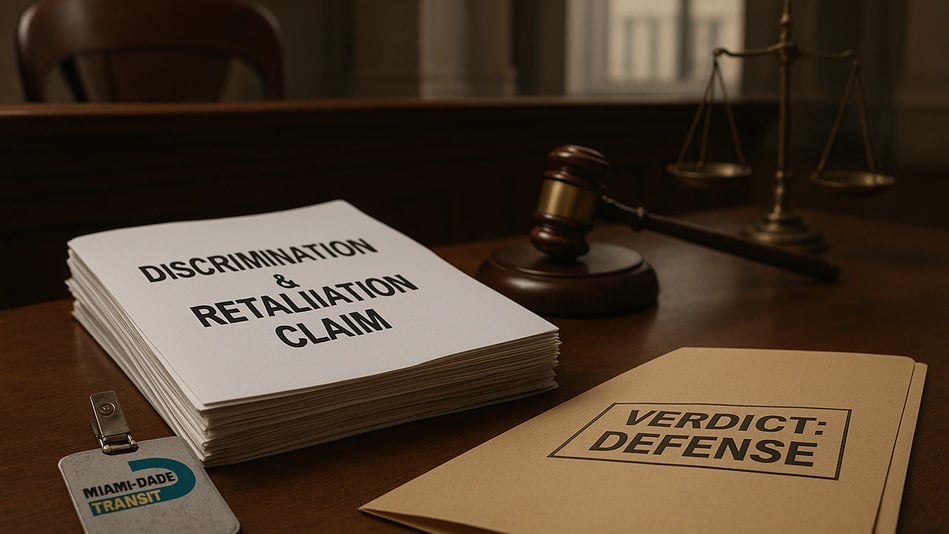Miami-Dade Wins Discrimination Trial in $1M Claim

Table of Contents
Case Background
This lawsuit centered on an employment dispute filed in the United States District Court for the Southern District of Florida. Plaintiff Lashandra Parker-Nashid, a forty-nine-year employee, brought the case against her employer, Miami-Dade County, specifically citing actions taken by the Miami-Dade County Transit department. The core of her claim revolved around allegations that her employer terminated her employment for illegal reasons, which included discrimination and retaliation.
Cause
Ms. Parker-Nashid asserted that Miami-Dade County Transit subjected her to an adverse personnel action her termination and "outrageous harassment" because of several protected characteristics and actions.
Discrimination
The Plaintiff claimed the adverse action was motivated by illegal discrimination based on her race, her gender, and her religion, which she identified as Muslim. She maintained that the county’s treatment violated her rights under Title VII of the Civil Rights Act of 1964.
Retaliation
In addition to discrimination, Ms. Parker-Nashid claimed the county retaliated against her. This action, she alleged, stemmed from the fact that she had previously filed complaints about what she identified as prohibited practices under the same federal civil rights statute.
Injury
The primary injury Ms. Parker-Nashid suffered was the loss of her employment with the Miami-Dade County Transit department after forty-nine years. This termination caused significant financial harm, resulting in lost wages and benefits, as well as non-economic harm related to the emotional distress and mental anguish, she experienced due to the alleged harassment and termination.
Damages Sought
Ms. Parker-Nashid’s Verified Complaint clearly requested damages in excess of One Million Dollars ($1,000,000). She sought this substantial amount to cover:
Compensatory Damages: Money to make up for lost wages and benefits, past and future, resulting from the termination.
Non-Economic Damages: Compensation for the pain, suffering, emotional distress, and mental anguish the discriminatory and retaliatory actions had caused her.
Punitive Damages: Money intended to punish Miami-Dade County for its alleged malice or reckless indifference to her federally protected rights, and to deter future misconduct.
Attorney’s Fees and Costs: Reimbursement for all legal expenses associated with pursuing the lawsuit.
Key Arguments and Proceedings
The case proceeded through the federal Court system, ultimately requiring a jury to hear evidence and decide the facts after Miami-Dade County vigorously denied the allegations.
Legal Representation
Plaintiff(s): Lashandra Parker-Nashid
· Counsel for Plaintiff(s): David P. Reiner, II | Michael A. Pizzi
Defendant(s): Miami-Dade County and Miami-Dade County Transit
· Counsel for Defendant(s): William X. Candela | Andrea Sofia De Ona | Rochelle Antoinette Hall
Key Arguments or Remarks by Counsel
The trial involved the presentation of evidence and testimony intended to persuade the jury about the true reasons behind the county’s decision to terminate Ms. Parker-Nashid.
Claims
The Plaintiff’s counsel argued that the evidence demonstrated a clear link between Ms. Parker-Nashid's protected characteristics her Muslim faith, her race, and her gender and the county’s decision to fire her. Counsel contended that the county’s actions constituted deliberate discrimination and that the alleged harassment and termination followed a pattern of retaliatory behavior after she complained about workplace practices. Counsel emphasized that after decades of service, the county suddenly applied strict disciplinary standards to justify a firing that it had truly motivated by prejudice or reprisal.
Defense
The defense counsel for Miami-Dade County countered the claims by denying all allegations of discrimination and retaliation. The county asserted multiple affirmative defenses, stating that the Plaintiff had failed to exhaust her administrative remedies with the Equal Employment Opportunity Commission (EEOC) before filing suit, that her claims were limited to the scope of her initial EEOC charge, and that some claims were untimely. Crucially, the defense also argued that even if Ms. Parker-Nashid’s religion, race, or gender played any part, the county had legitimate, non-discriminatory reasons that had fully motivated the decision to fire her. Essentially, they argued that the county would have fired her regardless of her protected status, based on documented performance or conduct issues.
Jury Verdict
Following the presentation of all evidence, arguments, and instructions from the presiding judge, the jury began deliberations and returned a verdict on November 14th, 2025, that absolved Miami-Dade County of legal liability in this matter.
The jury used a special interrogatory form to reach their findings.
First, the jury confirmed that Miami-Dade County did, in fact, discharge Ms. Parker-Nashid from employment.
Second, the jury addressed the central issue of discrimination based on religion. They determined that Ms. Parker-Nashid’s religion was not a motivating factor that prompted Miami-Dade County to discharge her. This finding immediately ended the jury’s deliberations on the religious discrimination claim, as they determined that her faith had not driven the county’s action.
Because the jury found that religion did not motivate the county’s decision, they did not proceed to the subsequent deliberations regarding whether the county would have fired her anyway or whether she should receive monetary damages for lost wages. The jury’s findings concluded the trial without an award of damages to Ms. Parker-Nashid on the specific claim presented to them. The ultimate verdict favored the defense, meaning that Ms. Parker-Nashid, in the end, recovered no monetary damages from Miami-Dade County in this federal case.
Court documents are available upon request at jurimatic@exlitem.com
